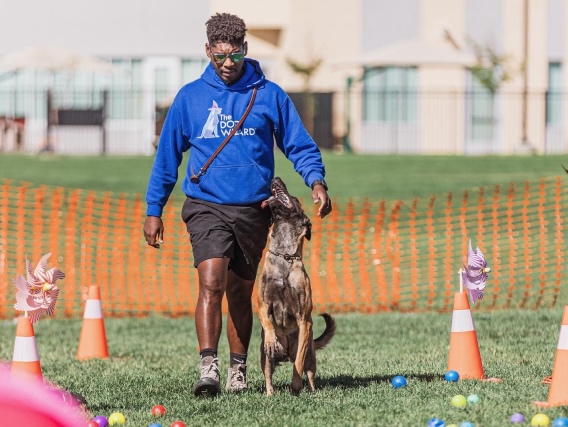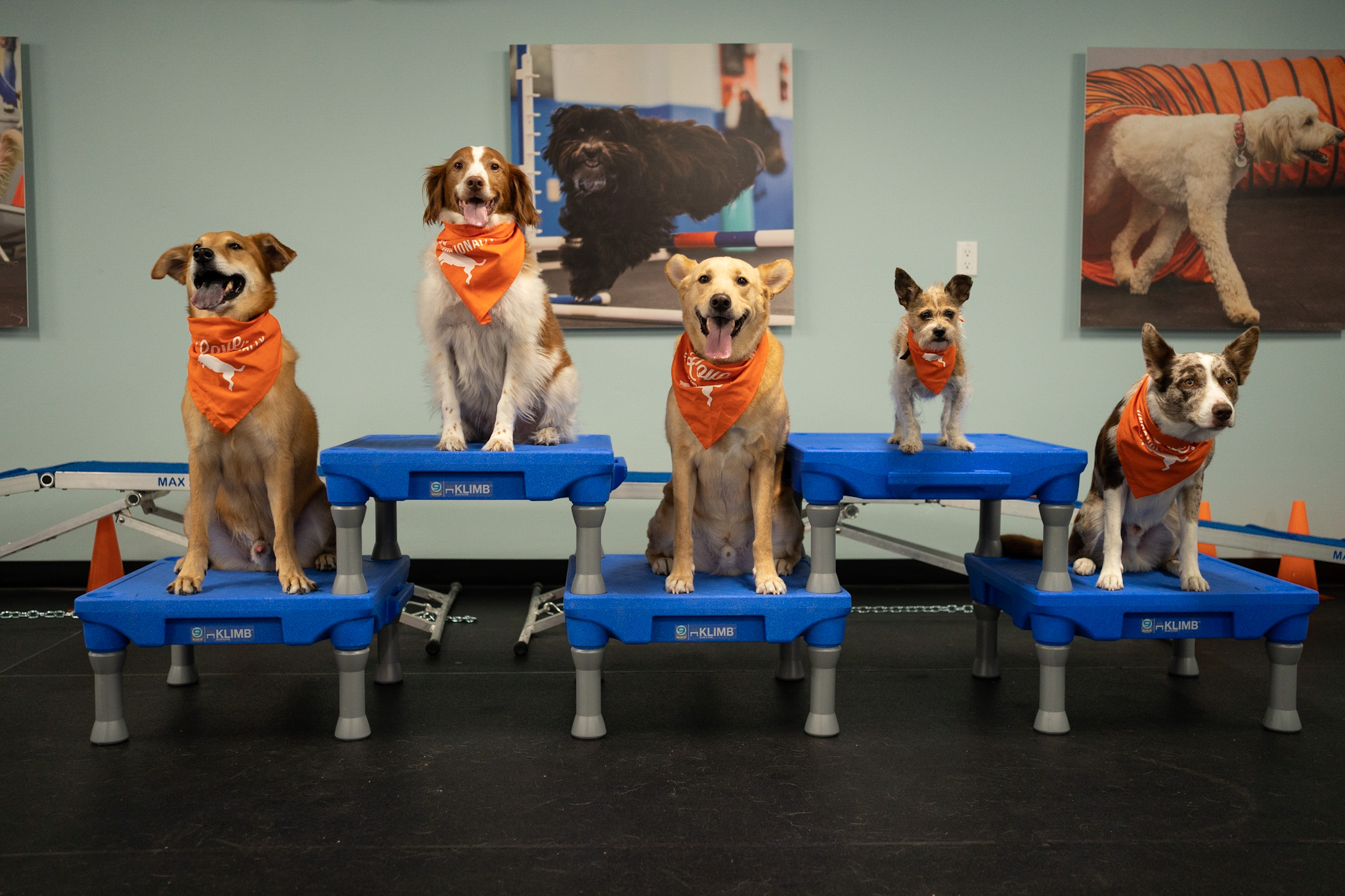Essential Canine Educating Tips for a Well-Behaved and Certain Pet
Reliable dog training is an essential aspect of promoting a confident and well-behaved family pet. Developing a regular routine, using positive reinforcement methods, and prioritizing early socializing are crucial elements that add to a pet's overall behavior and temperament. Additionally, mastering standard commands and without delay attending to any kind of behavioral concerns can considerably enhance the bond between you and your canine friend. The subtleties of these training techniques might not be instantly noticeable, leading several family pet proprietors to forget vital components that can make all the difference in their pet dog's advancement. What might these essential pointers involve?
Develop a Constant Regimen
Establishing a constant routine is important for effective pet dog training. A well-structured schedule provides canines with a complacency and predictability, which can substantially boost their discovering procedure. By establishing particular times for training sessions, feeding, walks, and play, you produce a framework within which your pet dog can thrive.

In addition, a regular aids in dealing with behavioral concerns. When a dog knows when and where to expect numerous tasks, it decreases anxiety and promotes a calm disposition. Regular exercise and psychological excitement must likewise be consisted of in the routine, as they are essential for a pet's health.
Use Positive Support
Positive reinforcement is an essential component of effective pet training, cultivating a strong bond in between the trainer and the pet while encouraging wanted actions. This training method includes gratifying your dog with treats, praise, or play instantly after they execute a preferred activity, such as coming or resting when called. The essential principle is that behaviors adhered to by favorable outcomes are most likely to be duplicated.
To apply favorable support properly, timing is critical. Incentives should be given without delay to assist your pet dog make the link in between the habits and the reward. Uniformity additionally plays a vital duty; use the very same commands and incentives to reinforce learning. If you compensate your canine for sitting, ensure you utilize the same verbal hint each time.
Furthermore, differ the rewards to maintain your dog engaged. Eventually, positive reinforcement advertises a joyous training experience, resulting in a well-behaved canine and a more powerful relationship in between the animal and proprietor.

Socialize Your Canine Early
A pet dog's capability to adjust to different settings and situations often depends upon early socializing. This crucial developmental stage typically occurs in between three and fourteen weeks of age, throughout which pups are particularly receptive to new experiences. By subjecting your pet to diverse people, pets, sounds, and settings during this moment, you can help foster a well-adjusted and certain adult.
Socialization assists protect against behavior concerns such as fear, aggression, and too much barking. When a pet dog is accustomed to find more various stimuli, it is much less most likely to respond adversely out of anxiety or uncertainty. Involving with various other pet dogs in controlled settings, such as pup courses or playdates, can additionally show essential interaction skills and proper play habits.
In addition, presenting your dog to various environments-- like parks, busy roads, and pet-friendly shops-- can enhance its convenience and flexibility in brand-new circumstances. Bear in mind, positive experiences throughout this developmental period are vital. Always make sure that these encounters are safe and delightful, and monitor your dog's responses to lead more communications. Ultimately, spending time in early socialization lays a strong structure for a well-behaved and certain family pet.
Teach Fundamental Commands
Building on the foundation of very early socializing, teaching basic commands is a crucial facet of pet dog training that improves communication in between you and your family pet. Basic commands such as "sit," "remain," "come," and "down" not only promote etiquette however also guarantee your canine's security in different situations.
To effectively educate these commands, begin in a quiet setting without diversions. Use positive reinforcement techniques, such as deals with or appreciation, to compensate your canine right away after they execute the preferred habits. Uniformity is crucial; repeat commands in a clear, firm voice and practice frequently to reinforce discovering.
Begin with easy commands, progressively enhancing complexity as your pet dog ends up being extra skilled. For instance, as soon as your pet dog dependably rests, you can introduce the "stay" command. Be client and enable your pet time to react and recognize. Short, constant training sessions are extra efficient than long, tiring ones.
Address Behavioral Issues Immediately
Attending to behavior problems immediately is essential for keeping these details an unified partnership with your pet dog. Delaying intervention can cause the support of unfavorable behaviors, making them more tough to remedy with time. Whether your pet shows hostility, extreme barking, or separation anxiousness, it is crucial to identify the source of these actions and address them swiftly.
First, observe the context in which the actions happens. Recognizing triggers will enable you to create a reliable training strategy. Uniformity is crucial; guarantee that all member of the family reply to the habits evenly to prevent confusing your dog. Use favorable reinforcement strategies, rewarding your pet for preferred actions while rerouting undesirable ones.
Sometimes, expert aid might be required. A certified pet dog instructor or behaviorist can offer tailored methods to resolve specific issues. Bear in mind that patience and determination are crucial, as therapy commonly requires time.
Eventually, by resolving behavior concerns quickly, you promote a favorable atmosphere that motivates your pet dog to thrive. This aggressive technique not only boosts your pet dog's behavior yet additionally reinforces the bond between you and your pet.
Conclusion
Finally, executing a consistent routine, making use of positive support, and focusing on early socialization are fundamental in developing a mannerly and confident pet (dog training charlotte nc). Showing standard commands with focused sessions fosters reliable communication between owner and pet dog, while promptly resolving behavioral issues prevents the rise of issues. Together, these methods develop a harmonious environment that boosts the bond between pets and their owners, ultimately leading to a better, healthier canine friend
Developing a regular routine, using favorable reinforcement techniques, and focusing on early socializing are crucial elements that add to a pet dog's total habits and character.Positive support is a crucial component of effective pet dog training, fostering a solid bond between the trainer and the pet while motivating wanted habits. Incentives ought to be provided quickly to aid your pet dog make the connection straight from the source in between the behavior and the incentive. Use positive reinforcement strategies, such as treats or appreciation, to award your pet dog right away after they perform the wanted behavior. Use positive reinforcement methods, compensating your dog for preferred behaviors while rerouting undesirable ones.